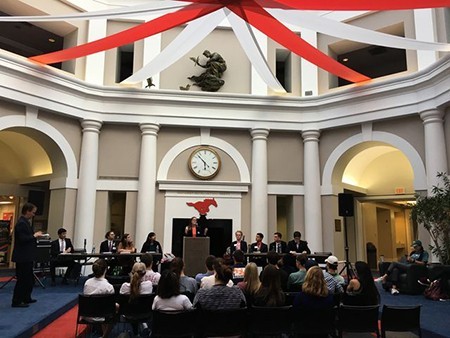Student Senate hosted the Senate Election: SBO Debate April 4. Candidates for President, Vice President and Secretary were present.
Candidates for President:
- David Shirzad
- Claire Hermeling
- Will Jones
Candidates for Vice President:
- Nathan DeVera
- Matthew Lucci
- Arthur Troy
Candidates for Secretary:
- Nancy-Gracen Klein
- Aleena Taufiq
- Davis Wells
- Fairooz Adams
All candidates currently hold positions in the 103rd Student Senate.
The Presidential candidates have specific ideas about how to increase performance and visibility of Student Senate.
Shirzad noted an element of approachability. “For senators, I want students to be able to walk up to you and be listened,” he said.
Hermeling focused on improving the internal workings of Senate, noting a “disconnect of the executive board to [the rest of] Student Senate.”
She plans to fix this issue by fostering an air of community.
“We can have events, so that we can have bonding between senators,” Hermeling said. “I want to make sure senators reach out to their constituents.”
Jones similarly turned to Senate’s external voice. He wants to improve visibility of Senate, so that the administration takes them more seriously.
“The power of the student voice has slowly been taken away,” Jones said. “I want to force students into meetings with the administration.”
Jones is the only Presidential candidate who has held an executive position in Senate, as Secretary. Shirzad currently serves as a Cox Senator and Hermeling serves as Communications Chair.
Though some parts of the presidential candiates’ platforms are similar, given unanimous issues on campus, there are some aspects that differ.
In support of sexual assault, Shirzad named the idea of having a first-ever teal football game.
Sexual assault is a major theme in Hermeling’s campaign.
“It’s an issue that is really a problem on this campus,” she said. “I want to educate on sexual assault,” she said. “There is no protocol after an assault occurs…there are offices in the Health Center for sexual assault, but there’s no one in them.”
Hermeling expressed faults in the way SMU deals with sexual assault reports.
“[SMU is] just sticking to the Title IX requirements, not taking the next step to be at the forefront on this issue,” she said.
Jones’ had his own distinguishing platform elements. Though his campaign for student body President is indicative of his highest aspirations, he will remain in Senate if results turn otherwise.
“I hope to win Cox Senator,” he said.
“I plan on staying, no matter what, in Student Senate. [Senators] really do have power,” he said.
Jones then turned to aspirations to create unity among the students.
“There is a division between student groups on campus,” he said.
Like many of the presidential candidates, Student Body Vice President candidate Nathan DeVera noted the same separation between Student Senate and the student body.
“People don’t know about Student Senate,” DeVera said. He hoped to spread visibility by tacking the Student Senate logo on as many places on campus, all the places that are Senate-related or run.
DeVera currently serves as Parliamentarian.
Candidate Matthew Lucci’s platform follows a similar line: increase the transparency of Senate.
“It’s easier to get things done when you make them visible, when you know who to go to to get your voice heard” Lucci said.
Student Senate’s main role is to be the voice of the students, specifically vis-à-vis the administration.
“We can’t represent you unless you know what we’re going to say before we say it to the administration,” Lucci said. He currently serves as a Lyle Senator.
Candidate Arthur Troy currently serves as Senate Scholarship Chair.
Like his contesters, he also sees a need to connect Senate to the student body.
“I’m here to make what you guys do better,” Troy said.
However, Troy’s other points are unique. He sees diversity and engagement as the two most pressing issues at this school.
“Diversity is the most important thing on our campus because it’s where we have a lot of room to grow,” Troy said.
As for engagement, he notices his peers, himself included, who come to class, but can’t wait until they can leave.
“That’s in part because half of the students at this school live off-campus,” Troy said. “We don’t have a place where [students who live off campus] can stay.”
Secretary candidate Nancy-Gracen Klein said communication and inclusivity are the main two problems on campus.
“People do amazing things,” Klein said, “but we never hear about them.”
Klein also wants to build a bridge between Student Senate and the student body, Student Senate and the administration, and the student body and the administration.
Secretary candidate Aleena Taufiq also wants to bridge all SMU entities together. And she has a two-pronged agenda to do so.
Taufiq wants to send Friday weekly updates from the office of Student Senate.
She also wants to ensure that at least one Senate member goes to all the events on campus to increase visibility and make sure constituents are in touch with that which they represent and fund.
Organization outreach was also a priority of Davis Wells, Secretary candidate. However, he plans to do so in a financial capacity, a reflection of his lessons learned on the Senate Finance Committee.
“Offices and clubs are in competition with one another,” Wells said. “But it shouldn’t be that way… student groups that don’t get a lot of funding, but should.”
Fairooz Adams was not present at the debates.
Voting begins Wednesday April 5 and ends Thursday April 6 at 5 p.m.









